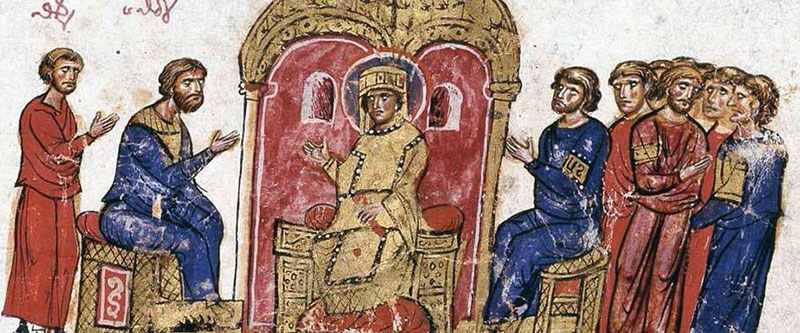Lately I’ve been preaching through the “kingdom psalms” (Psalms 93-100). These psalms include as their common theme a call to worship God. That theme got me thinking about Christian parents leading their families to worship. No one is exempt from challenges in leading their family in worship at church. So how can parents live faithfully before God in this area? How can parents responsibly lead their families to meet with God and His people in worship? Those questions could be addressed by sharing information, or it could examine the experience of worship in families.
In this article there will not simply be a consideration of knowledge. Knowledge is crucial to the Christian life. Normally in adults life is a progressive movement from knowledge in the head to belief in the heart to expression with the hands. However, in children parental example is integral to form assumptions in the minds of children. These can have a lasting impact on the way they will understand life as adults. So rather than considering what facts children should know about worship, this article looks at parental leadership and example and how it informs an understanding of worship in children before they may even understand all that is happening. I will begin with a parent’s negative example.
- The Impact of Neglecting Worship
There are many reasons why people for a season excuse themselves from worship. Some of them are legitimate, some are understandable but not helpful, and some are simply bad reasons. The latter two will have unwanted negative results in children.
First, there are legitimate reasons. These include suffering an illness, or caring for someone else who is, employment in areas of mercy and necessity. Nurses, doctors, nursing home staff performing necessary medical service to the sick and elderly does nothing to neglect the call to worship, but actually compliments it. There other such reasons, but these legitimate reasons will in no way be a negative example to children.
Second, there are understandable reasons that are not helpful. There are times when, as a pastor, I sympathetically understand why folks stay away from worship. But when I talk to them, I counsel them to be present at worship because it is actually more helpful to them. For example, a person who has suffered a trauma in his life such as the passing of a loved one, or an embarrassing confession of sin may be tempted to stay away. Perhaps the difficulty of repeatedly answering the same painful questions seems too much to handle. These struggling brothers and sisters should be encouraged by the spirit of gentleness displayed by the saints (Gal. 6:1) and welcomed in the church.
However, when worship is neglected in these circumstances, it teaches a lesson for watching children. They see parents worshiping God when things are going well, but when hardship comes worship is withdrawn. They see people looking for comfort and encouragement away from the people of God in their most pressing needs. And yet, the Bible teaches that all circumstances come from the Lord, and so His worship should not be neglected on account of hardship.
Third, there are bad reasons to neglect worship. These reasons include preferring time to visit with friends or family who are in-town for the week-end, catching up on needed work around the house, and so on. The unnecessary neglect of corporate worship is a significant disconnect with a Christian profession of faith. Psalm 122:1 presents the heart of the Christian when it comes to worship: “I was glad when they said to me, ‘Let us go to the house of the Lord!’” (English Standard Version). But for the watching eyes of children, parents who stay away from worship teach children a detrimental lesson with unpredictable consequences.
Using the example of neglecting worship for time with family and friends, parents in that moment teach the child, perhaps unintentionally, that family is more important than God. I do not know Christian parents who would say that, but their actions at time establish that. The choice has been presented and God has not been preferred. And once that choice has been presented as a legitimate option, the parent will have no grounds to object to the preference of personal choice in any other area. Children may apply the same choice to recreation, work, or other things. In that scenario, actions have spoken and the lesson is clearly taught.
- A Valuable Lesson to Be Taught by Being Present in Worship
But parents do come to worship. They do set a positive example by being present at church, which has positive practical consequences. Broadly speaking, participating in worship gives children a healthy understanding of their importance compared to God. An important aspect of being a well-adjusted person is the correct understanding of personal importance. In today’s self-help secular parenting world, children are often raised to think they are uniquely special. Their needs are to be met, and their opinions are to be respected and maybe even followed. Of course, it is good to make sure children know they are precious to their parents. But that affirmation should have limits. No child is more precious that God. And so, it is good for children to learn there are moments where their personal preferences and desires must “take a back seat.” Worship is one of those moments. What parents allow and forbid as part of worship prepares a child to recognize that he and God are not peers, which has further implications for all of life. Parents can set prohibitions and requirements to aid in learning that lesson.
First, children should not be an unnecessary distraction in worship. The church has gathered to focus on the Lord, not to focus on children. Therefore, no child should be allowed to make himself the focus either by excessive noise, disobedience, or turning around in the seat and entertaining the people sitting behind. When a child is not able to be in church without becoming a distraction, he should not remain. Perhaps there is a quick fix that can happen in the foyer of the church. Perhaps more training is necessary in the home to prepare a child to sit still. If the church has a nursery, parents should take advantage. Parents themselves should then assess together what is missing that would enable their child to be part of corporate worship. It is not always easy to discern, however a constant parade in and out of a service to correct a wayward child, indicates that child may not be ready to sit in church. Not only will both parent and child not participate in worship, most likely the people around them will not either. And that is to miss the purpose for coming together. Do not misunderstand. As a pastor, I am glad to hear the noises of a child learning to adjust himself to worship. The loud, off-key singing is great. The out-loud answer to rhetorical questions in the sermon often puts the adults to shame. Even the restless wiggles being brought under control should not distract a person who has come to worship. But there is a point when a child becomes an unhealthy distraction.
Second, children should not be permitted to act on every impulse they have during worship. The two main culprits in this regard are probably requests from children for drinks of water and going to the bathroom. Dealing with requests for drinks of water is by far the easier of the two. From a practical standpoint, it is highly unlikely that your child will not survive the remaining 30 minutes of a service without a drink of water. Requests for a visit to the bathroom carry with them a greater sense of risk. However, just a little bit of thinking ahead can even alleviate the urgency of this question. Parents can require a visit to the facilities before the service starts. That requires attentiveness from the parents and perhaps a couple of calculated but risky refusals.
In reality, children asking about bathrooms and water fountains are probably looking for a reprieve from sitting still more than presenting an actual need. But whatever the case, here parents have an opportunity to practically demonstrate that the child is not as important as the worship of God. A parent may say, “No son. We are here to worship the Lord. You can wait for a drink until we are done.” That refusal demonstrates to the child that their impulse for a drink or simply to move around does not outweigh or supersede the call to glorify God in the context of the gathered worship of His people.
Third, children should be prepared to participate in worship. Some preparation will happen through the accumulation of experience in worship. The week-in, week-out participation in Sunday worship will make children relax and enable them to join in. However, there are also some proactive things that can be done at home. For churches which recite creeds or the Lord’s Prayer corporately, children can be helped in committing them to memory. Once memorized they will be able to participate. Parents can insist that older children participate in the songs of the church and give them a little pro-active “coaching.” Perhaps it is as simple as, “Remember, we are going to worship the Lord today, and I want to see you singing along with the rest of the people.” Parents can also provide ways to help children listen to preaching. Children can be encouraged to write down a few notes of things they heard the pastor say. However, be careful that this tool is not allowed to cause the child to tune out what is said as he develops his favorite cartoon characters. In all these ways, children can be shown the privilege of worshiping God. And the aim is not just quiet children, but those who respect worship and, more significantly, participate in it.
All parents have failed in leading their family in worship. Some have been too lacks, others too strict. But past failures should not excuse a renewed commitment around healthy expectations in our families regarding the worship God. Parental instruction or example should not undermine the supremacy of God, and where parents have allowed that to happen, adjustments should be made. That is no cause for shame or embarrassment. It is a necessary and on-going correction that all people must at times make. It is part of their own sanctification and their responsibility to present their children to the Lord for worship.








